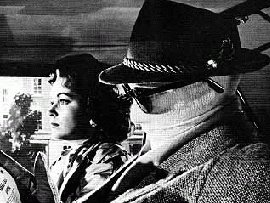Click below to link to:
![]() Not another concept of processing
Not another concept of processing
![]() Does the concept of emotional processing commit the fallacy of tautology?
Does the concept of emotional processing commit the fallacy of tautology?
![]() Emotional processing and disorders; cause or effect?
Emotional processing and disorders; cause or effect?
![]() Back to main page
Back to main page
![]() References
References
 One of the problems of emotional processing is that observed behaviour (intrusive thoughts, flashbacks, nightmares) are thought to be the result of something not happening – that is failure of emotional processing. Likewise, the failure of test probes to discover these disturbances is taken to indicate that emotional processing has happened. Although this is grounded in behaviour and can be tested out, it does assume an unseen process – emotional processing.
One of the problems of emotional processing is that observed behaviour (intrusive thoughts, flashbacks, nightmares) are thought to be the result of something not happening – that is failure of emotional processing. Likewise, the failure of test probes to discover these disturbances is taken to indicate that emotional processing has happened. Although this is grounded in behaviour and can be tested out, it does assume an unseen process – emotional processing.
In clinical terms, the phenomenon to which this refers is fairly easily observed. For instance, a person who witnesses their child being injured in a car crash, may well have powerful images, flashbacks or nightmares of the event, intruding into their consciousness, independent of their own volition. The decrease of these intrusive phenomena over time suggests some process of absorption or accommodation or decay has occurred. Some individuals appear to ‘get stuck’ and fail to process such material, often experiencing flashbacks and other emotional phenomena for years. If they are seen by a psychiatrist or psychologist, they might get diagnosed as having post traumatic stress disorder, which has a set of clear diagnostic criteria (Diagnostic and Statistical Manual of the American Psychiatric Association).
Some researchers suggest that those individuals who develop post traumatic stress disorder have styles of coping which impede processing such as suppression of the traumatic memories, or avoiding thoughts about distress (Horowitz 1986). A number of psychotherapeutic strategies such as exposure to the traumatic memories, discussing and understanding the experience in depth and incorporating new information about the trauma have the capacity to reduce the intrusiveness, emotionality and strength of the unpleasant memories (Ramsay 1975, , Foa, Feske, Murdock, Kozak & McCarthy 1991, Foa, Riggs, Gershuny 1995, Foa & Rothbaum 1997, Whelton 2004). Referring to this as ‘emotional processing’ doesn’t explain exactly what goes on, but appears to capture something of the nature of the blockages and the change process during psychological therapy.
There are parallels in other areas of psychology. One of the most respectable theories of the not is the learning theory concept of extinction. Learnt behaviour which is no longer followed by a reinforcing event may reduce in frequency. This process of reduction is referred to in learning theory as ‘extinction’. There may be greater ‘resistance to extinction’ if a variable ratio schedule of reinforcement rather than a fixed ratio schedule has been used in the initial learning process. Extinction is inferred when the relevant learnt behaviour ceases to occur, in a similar way that emotional processing is inferred when specific aspects of emotional experience (flashbacks, nightmares) cease to occur. Obviously, emotional processing does not have the pedigree of extinction but it does suggest that a process inferred from the emergence and decline of behaviour set within predefined parameters is scientifically acceptable.
As I was going up the stairs
I met a man who wasn’t there
He wasn’t there again today
I wish, I wish he’d stay away
Hughes Mearns 1875-1965